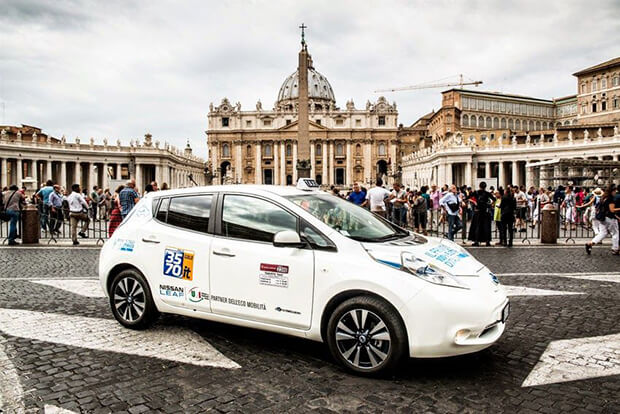Italy Wants to Put a Million Electric Cars on the Road

Italy has the most sluggish market for electric cars in the whole of Europe and to catch up with the emerging EV market, they are rolling out an ambitious plan to put 1 million electric vehicles on Italy’s roads. It is estimated that cost of the plan will cost the state almost €10 billion in incentives.
The incentives that are being called for are specifically to support the acquisition of electric and hybrid vehicles and they plan to have a cash-for-clunkers program. Some are contending though, that the plan to have 1 million battery-powered cars on the road by 2022 is extremely unrealistic, making Italy Europe’s leader in electric cars?
The number of electric vehicles planned to be put on the road is a very aggressive target indeed. One government spokesman confirmed that the Italian government is working toward the target, without clarifying whether the 1 million-car figure referred to fully-electric models or also included hybrids, and declined to comment on the ultimate cost of the plan.
Only 2,600 fully electric cars were sold last year in the whole of Italy out of a total of about 2 million cars sold, and the number rises only to around 4,800 if plug-in hybrid models are included, according to the European Automobile Manufacturers Association. Amazingly, fewer than 5,000 fully electric models are estimated to be on the country’s roads today.
To go from being an electric car backwater to Europe’s biggest EV market in just four years seems to be extremely ambitious and unrealistic. The Italian government would need to roll out incentives at least at the level of Norway, which could cost several billion euros, analysts say. Even that might not be enough. An aid Promotor research institute head, Gian Primo Quagliano, who’s tracked the country’s car sales for 25 years said:
“If you want 1 million electric cars on Italian roads in the next five years, the only option is huge tax benefits like Norway’s. The government would be looking at incentives of about $10,000 a car, like France,” he said. Even at that level -- roughly $10 billion -- “it still remains almost impossible to get there so quickly.”

In Norway, Europe’s e-car leader, incentives cover everything from tax breaks, to exemptions from tolls to free ferry passage. Norwegians can expect about 9,000 euros in incentives on an electric version of Volkswagen AG’s Golf or 7,000 euros for a VW Up. In France, which could triple its electric car sales to about 150,000 by May 2022 according to Bloomberg New Energy Finance, incentives run to about 10,000 euros per electric car purchase.
Deliveries in Europe’s less vibrant EV markets, excluding fast-growing France, Germany and the U.K., are set to increase from 182,000 in 2018 to 354,000 in 2022 so Italy to expect 1,000,000 electric vehicles seems farcical at this particular juncture. In saying that though, few doubt that Italy will eventually embrace electric cars on a grand scale like other car markets around the world as regulators and politicians across the spectrum are pushing for zero-emission vehicles. The city of Rome will ban diesel cars beginning in 2024 and Milan has begun drawing up plans for a diesel-free future as well.
Italian drivers are already embracing alternatives to the combustion engine and Italy is recognised by far as Europe’s biggest market for vehicles running on natural gas, selling about 230,000 last year.
The Chief Executive Officer of Fiat Chrysler, Sergio Marchionne, who was once an EV sceptic, now says his company will invest 9 billion euros to develop electric cars by 2022. Marchionne expects that by 2025 fewer than half the cars sold globally will be fully combustion-powered.
Di Maio, whose hometown in southern Italy is not far from Fiat’s Pomigliano plant, made a point of applauding Marchionne’s new stance shortly after the new government took office. "We can finally start our projects, including the 1 million-electric car target,” Di Maio said in a post on Facebook.

Author

Justin Kavanagh
Justin Kavanagh is a recognised leader
in automotive intelligence and vehicle
data supply to the entire motor industry.
He has almost 20 years experience in
building systems from the ground up.
As the Managing Director of Vehicle
Management System, he understands the
need and importance of trustworthy and
reliable vehicle history and advice to
both the trade and the public.
Follow me on LinkedIn